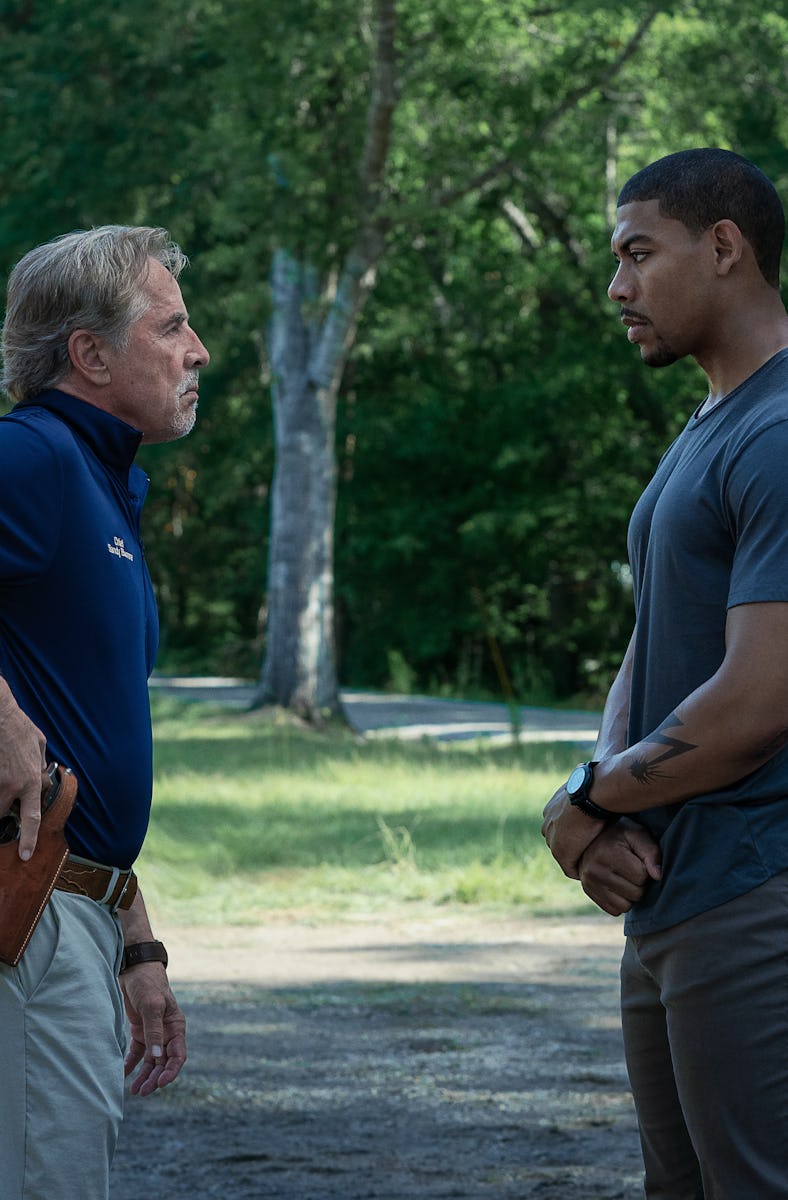Rebel Ridge Is a Ticking Time Bomb With No Release
Jeremy Saulnier’s Netflix thriller isn’t the ACAB epic you think it is.

Jeremy Saulnier is building a formidable reputation as a master of tension. Each of his films is a pressure cooker in its own right, reveling in chaos, cruelty, and (most importantly) retribution. His latest, Rebel Ridge, wants to follow that same path, but the Netflix thriller is too focused on the cruelty, and not enough on the retribution.
The film opens with a blindsiding — though not unfamiliar — act of police brutality. After selling his car and his stake in a restaurant, former marine Terry (Aaron Pierre) is cycling through a rural town when he’s run off the road by a police car. A pair of white cops throw around some particularly loaded microaggressions, then proceed to seize the $36,000 stashed in his backpack — the money he needs to keep his cousin, a key witness in a gangland trial, out of state prison, where he’ll most certainly be murdered.
What’s baffling about Terry’s predicament is that it’s 100% legal. As he later learns from Summer (AnnaSophia Robb), a well-meaning court clerk, the cops of Shelby Springs, Louisiana have been using the law to snatch up large sums of money. The town, Summer explains, is flat broke, and its PD is the last one standing for miles. So its sheriff (a slimy, self-satisfied Don Johnson) takes it upon himself to find capital elsewhere.
The intricacies of Sheriff Burnne’s plot are admittedly complicated, and Rebel Ridge takes its sweet time untwisting its central conspiracy. That takes some wind out of the story’s sails, particularly in its sluggish second act. The time that Terry spends working to uncover Burnne’s subterfuge might have been better spent focusing on his unique set of skills. Terry is revealed to be the kind of hyper-competent action hero that the bad guys love to underestimate. Not only is he a retired Marine, but he spent years training the corps in unarmed martial combat. That, ironically, creates yet another wrinkle for Rebel Ridge to work through: Terry’s a master of non-lethal de-escalation, which, while impressive, frequently impedes the promise of explosive confrontation.
There’s likely no better time to set a Rambo-esque revenge tale in the splintered deep south or explore systemic corruption in a post-ACAB world. Saulnier raises compelling questions about power and its abuse, but it’s in attempting to answer those questions that Rebel Ridge starts to stumble. By the time the dust settles, Saulnier’s restraint might cripple the film entirely, preserving the status quo when he ought to be letting it burn.
If nothing else, Rebel Ridge represents a career-defining turn for Aaron Pierre.
Films about corrupt cops are not unlike satirical, class-conscious thrillers. Few mainstream dramas are ever going to condemn their subjects outright. The same could be said for Rebel Ridge’s appetite for violence. No one expects Terry, a decorated veteran, to go around massacring dirty cops — but his restraint is especially frustrating in the face of so much mounting, systemic violence. The closer he and Summer get to uncovering Burnne’s master plan, the lower his lackeys stoop to stop them. It gets hard to stomach before long — and it’s made all the more frustrating by Terry’s reserve. We’re left waiting for a showdown that never really comes, and catharsis that ultimately falls flat against a nonstop assault of dehumanization.
If nothing else, Rebel Ridge is a slow burn with a passing interest in social justice. Saulnier’s pursuit of nuance ultimately leaves a lot to be desired. It’s this film’s fatal flaw and the one thing holding back a truly compelling story. If it didn’t pull so many punches, Rebel Ridge could have been a stellar riff on First Blood. Pierre is especially commanding as Terry, flitting effortlessly between feral intensity and practiced composure. He finds a great antagonist in Johnson’s smarmy sheriff, and a capable ally in Robb. Their performances occasionally make up for the film’s lack of urgency. Even if Rebel Ridge never quite gets to the explosive action it promised, it does deliver a potent character study.